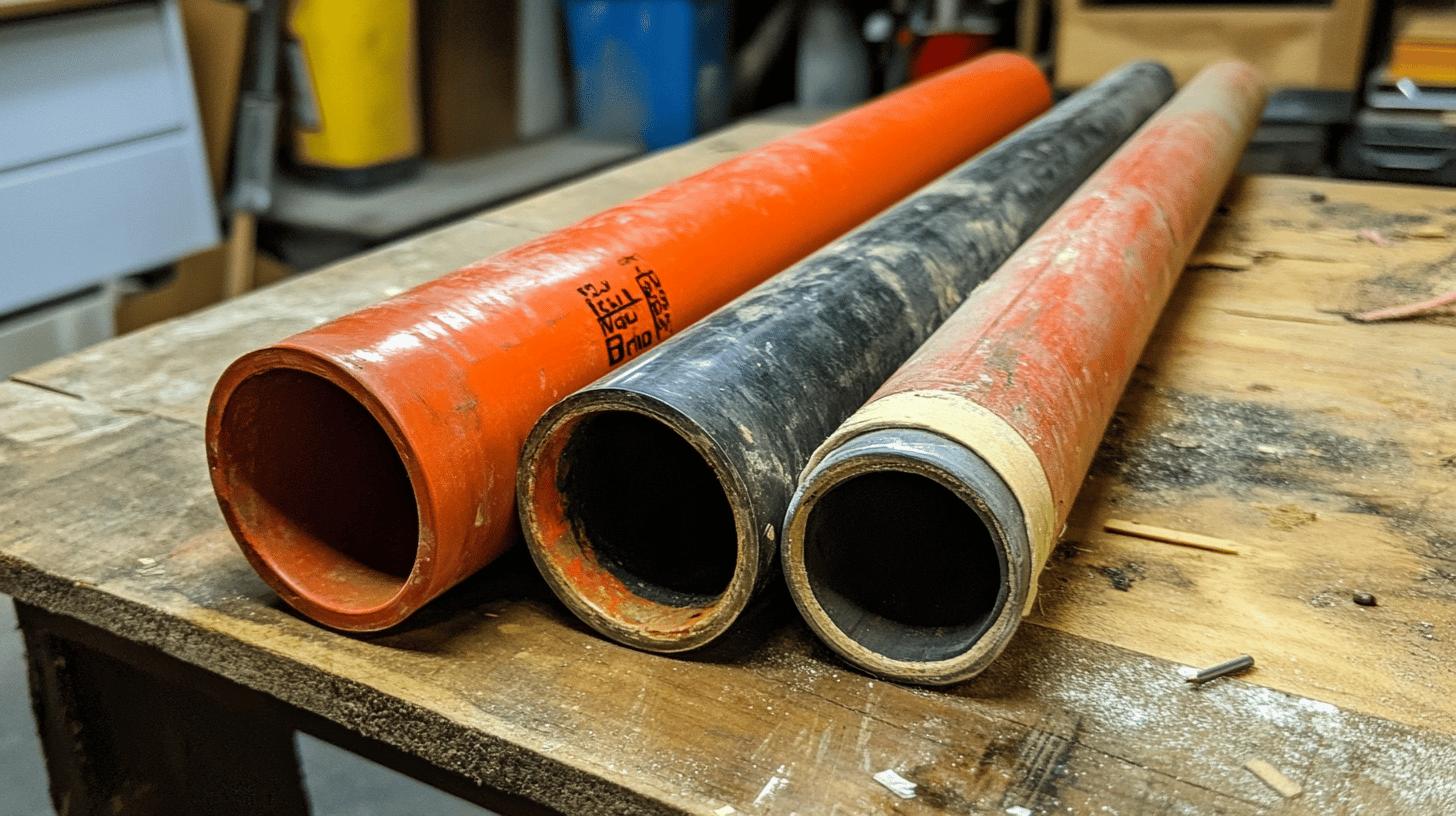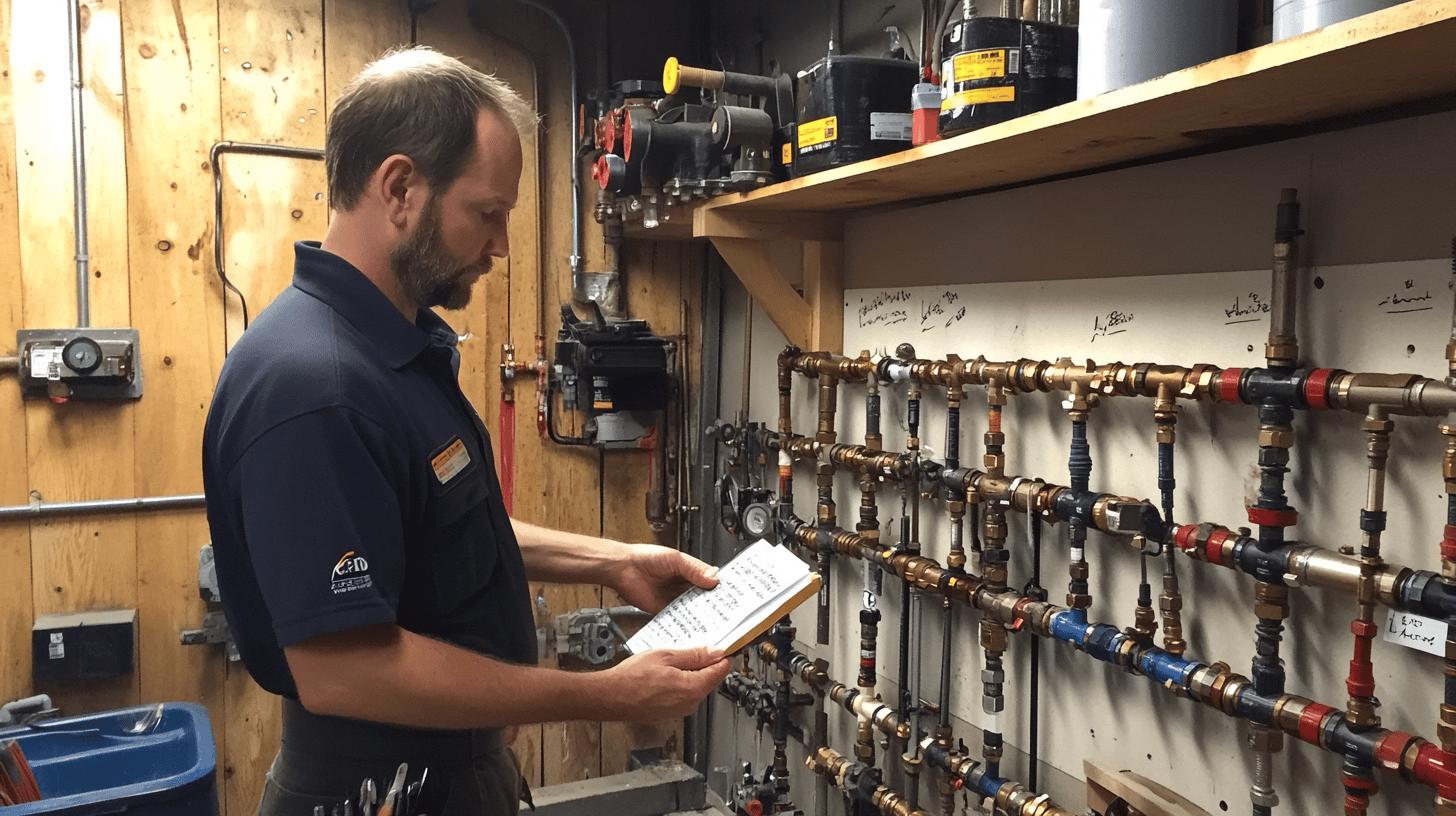TL;DR:
- Best PVC Pipe for Water Supply: Lightweight, chemical-resistant, ideal for cold water, available in 1/2 to 4 inches.
- PVC vs. CPVC: PVC is for cold water; CPVC handles hot water (up to 200°F) and has better thermal resistance.
- Cost: PVC is cheaper; CPVC is pricier but may be worth it for hot water applications.
- Safe Materials: Copper (durable, bacteria-resistant), PEX (flexible, corrosion-resistant), CPVC (heat and chemical resistant).
- Choosing Pipes: Assess temperature needs, flexibility, local codes, cost, and consult a plumber.
- PVC Maintenance: Avoid sunlight, ensure proper installation, inspect for damage, replace old pipes promptly.
Choosing the right PVC pipe for your water supply can be tricky with so many options available. So, how do you figure out which one is best for you? It’s important to understand why PVC pipes are the top choice for water supply systems. They’re lightweight, resistant to chemicals, and easy to install, making them popular with both plumbers and homeowners.
As you look into the best PVC pipes, you’ll learn about their specifications and why Schedule 40 is frequently recommended for both water supply and drainage systems.
Top Choices for the Best PVC Pipe for Water Supply
When it comes to water supply options, PVC pipes are a top choice thanks to their durability and cost-effectiveness. Made from plastic and vinyl, these lightweight yet strong pipes are easy to install. Their chemical resistance means they last a long time with little maintenance, making them a smart choice for homeowners and businesses alike. Plus, PVC pipes are perfect for cold water plumbing and drainage since they resist corrosion over time.
Picking the right type of PVC pipe is crucial for getting the best performance in your water supply system. Schedule 40 PVC is often recommended for both water supply and drainage because it’s thick and durable. These pipes come in sizes ranging from 1/2 inch to 4 inches in diameter, which can meet various plumbing needs and ensure a steady water supply. Choosing the right PVC type can really enhance your plumbing system’s efficiency and lifespan.
- Lightweight and easy to install
- Chemical resistant
- Suitable for cold water systems
- Available in various sizes
- Ideal for both water supply and drainage
Comparing PVC vs. CPVC for Water Supply

What’s the difference between PVC and CPVC pipes? The main difference is their temperature resistance. CPVC, which is a chlorinated version of PVC, can handle higher temperatures, making it ideal for hot water delivery—up to about 200 degrees Fahrenheit. In contrast, PVC is best for cold water plumbing because it’s more cost-effective and resistant to corrosion, but it can warp if exposed to high temperatures, so it’s limited to cold water systems.
When it comes to safety and durability, both PVC and CPVC have great safety ratings for chemical resistance, ensuring that drinking water stays uncontaminated. The extra chlorine in CPVC not only boosts its thermal resistance but also helps it handle chemical exposure better, making it a safer option for hot water. As for durability, both materials are long-lasting, but CPVC might perform better in high-temperature situations.
Now, let’s talk about cost. Typically, PVC is cheaper than CPVC, which is why it’s popular for standard plumbing jobs. However, CPVC’s higher upfront cost might be worth it for hot water applications, as it can reduce the risk of warping and system failures. Ultimately, your choice should weigh immediate costs against long-term reliability based on what your water supply system needs.
|Feature | PVC | CPVC |
|———————–|——————————————|——————————-|
| Temperature resistance| Low, not suitable for hot water | High, suitable for hot water |
| Application suitability| Cold water systems | Hot water systems |
| Safety ratings | Good chemical resistance | Excellent chemical resistance |
| Cost considerations | More affordable | Higher initial cost |
Safest Pipe Materials for Drinking Water
Why are copper pipes a top choice for drinking water supply? They’re known for being reliable and durable, making them a long-lasting option for potable water. Their non-permeable nature prevents bacteria from growing, helping maintain water quality. Plus, copper is resistant to high temperatures and corrosion, which is why it’s a preferred material for drinking water systems, even though it tends to be more expensive and harder to install than other options.
So, why are PEX pipes becoming popular? PEX pipes are flexible and super easy to install, which makes them a great pick for residential plumbing. They resist scale and chlorine damage, ensuring safe water transport. While PEX is often cheaper and easier to work with than copper, some people worry about the cross-linking chemicals potentially affecting water quality.
What about CPVC pipes? CPVC pipes offer a good balance of heat and chemical resistance, making them ideal for hot water applications. Their chlorinated structure allows them to handle higher temperatures, so they’re a safe choice for water systems that need to endure heat. However, CPVC can become brittle over time, especially in colder climates, which might make them less appealing for some uses.
- Copper: Durable and bacteria-resistant
- PEX: Flexible and corrosion-resistant
- CPVC: Heat and chemical resistant
How to Choose the Right Pipe for Your Water Supply

How do you choose the right pipe for your water supply? Start by looking at factors like temperature resistance, flexibility, and how easy it is to install. Different pipe materials handle temperature changes in various ways, so pick one that fits your needs. For hot water systems, materials like CPVC or PEX might be your best bet for thermal resilience. Choosing a flexible material can make installation easier, especially in tricky setups, which can save you time and money.
Why should you think about local regulations and specific application needs? Local plumbing codes and your specific application can determine which materials are suitable. Some areas might have restrictions based on climate or environmental issues. If you’re installing pipes underground, you should also consider the soil type and any potential chemical exposure. Keeping these factors in mind helps ensure you’re compliant and that your system lasts.
- Assess temperature resistance needs
- Consider flexibility and installation ease
- Check local plumbing codes
- Evaluate cost and durability
- Consult with a professional plumber
Why should you consult with a professional plumber? Experienced plumbers provide valuable insights on choosing the right materials based on their expertise. They can help you navigate the complexities of selecting the best pipes, considering important factors you might overlook. Hiring a pro ensures your plumbing system is efficient and compliant, reducing the risk of problems and extending its lifespan.
Common Issues and Maintenance Tips for PVC Water Pipes
What are some common issues with PVC pipes? If they’re not installed correctly, they can warp, especially in high temperatures since PVC isn’t designed for extreme heat. Sunlight can also be a problem; UV rays can weaken the pipes over time. Signs that it might be time to replace them include leaks, discolored water, and low water pressure, which could be caused by corrosion, blockages, or other damage to the system.
How can you maintain PVC pipes to make them last longer? Proper maintenance is key to reducing problems and ensuring they work well over time. Keep them out of direct sunlight to avoid UV damage. Make sure they’re installed correctly by using the right fittings and securing connections to prevent leaks. Regularly check for leaks or any damage to catch issues early, which can save you money on repairs. If you notice worn pipes, replace them promptly to keep your plumbing system efficient.
- Avoid direct sunlight exposure
- Employ correct installation techniques
- Inspect regularly for leaks or damage
- Replace deteriorating pipes promptly
Final Words
Knowing which PVC pipe is best for your water supply is key to having a reliable plumbing system. PVC is popular because it’s durable, lightweight, and cost-effective. For optimal performance, consider specifications like Schedule 40. When comparing PVC to CPVC, each has its strengths that suit different temperatures and applications.
Remember to keep in mind factors like safety, temperature resistance, and local codes when choosing your pipe materials. Regular maintenance is also essential to ensure they last and perform well. With smart choices and proper care, your water supply system can stay efficient and safe for years.
FAQ
Best Pipe for Water Supply in Home
Q: What is the best pipe for water supply in a home?
A: The best pipe choice depends on application needs. For cold water, PVC is ideal due to its lightweight, cost-effectiveness, and chemical resistance. For hot water, consider CPVC or copper for their heat resistance.
Are PVC Pipes Safe for Drinking Water?
Q: Are PVC pipes safe for drinking water?
A: PVC pipes are safe for cold water systems. Ensure you’re using food-grade PVC labeled as safe for drinking water applications.
Types of Pipes for Water Supply
Q: What types of pipes are used for water supply?
A: Common water supply pipes include PVC, CPVC, copper, and PEX. Each has unique benefits such as flexibility, temperature resistance, and bacterial resistance.
Best Pipe for Underground Water Supply Line
Q: What is the best pipe for an underground water supply line?
A: For underground lines, PVC or PEX are recommended due to their durability and resistance to corrosion.
Which Brand PVC Pipe is Best for Water Supply?
Q: Which brand PVC pipe is best for water supply?
A: Top-rated brands include Charlotte Pipe, JM Eagle, and Cresline. These brands offer reliable quality and certification for potable water use.
What Type of PVC Pipe Should I Use for My Main Water Line?
Q: What type of PVC pipe should I use for my main water line?
A: Use Schedule 40 PVC for main water lines due to its thickness and durability, ensuring it meets local building codes for water safety.
What is the Best Pipe Material for Drinking Water Supply?
Q: What is the best pipe material for drinking water supply?
A: Copper is often regarded as the best due to its durability and resistance to bacteria, while CPVC and PEX are good alternatives for their flexibility.
Best Pipe for Residential Water Line
Q: What is the best pipe for a residential water line?
A: For residential mains, PVC is excellent for cold water. CPVC is suitable for hot water lines, offering heat resistance and reliability.

